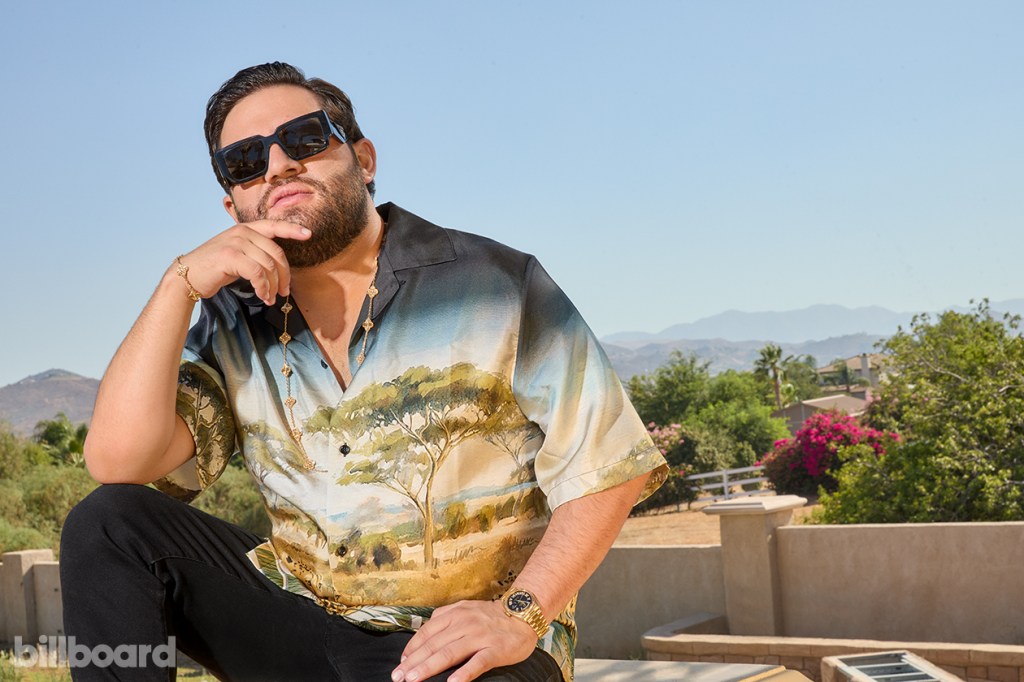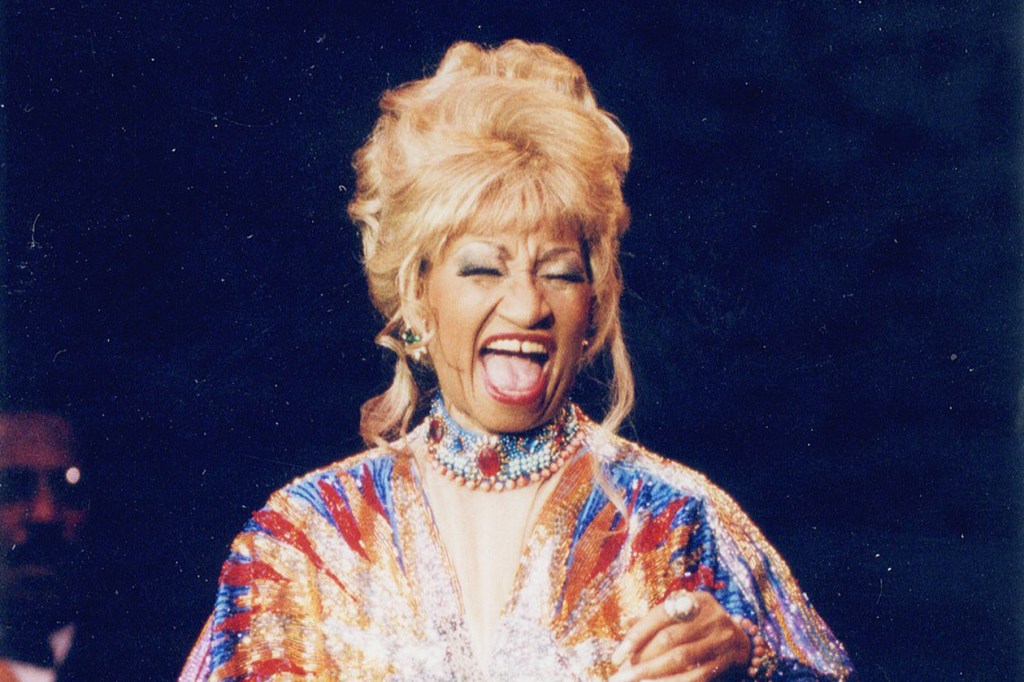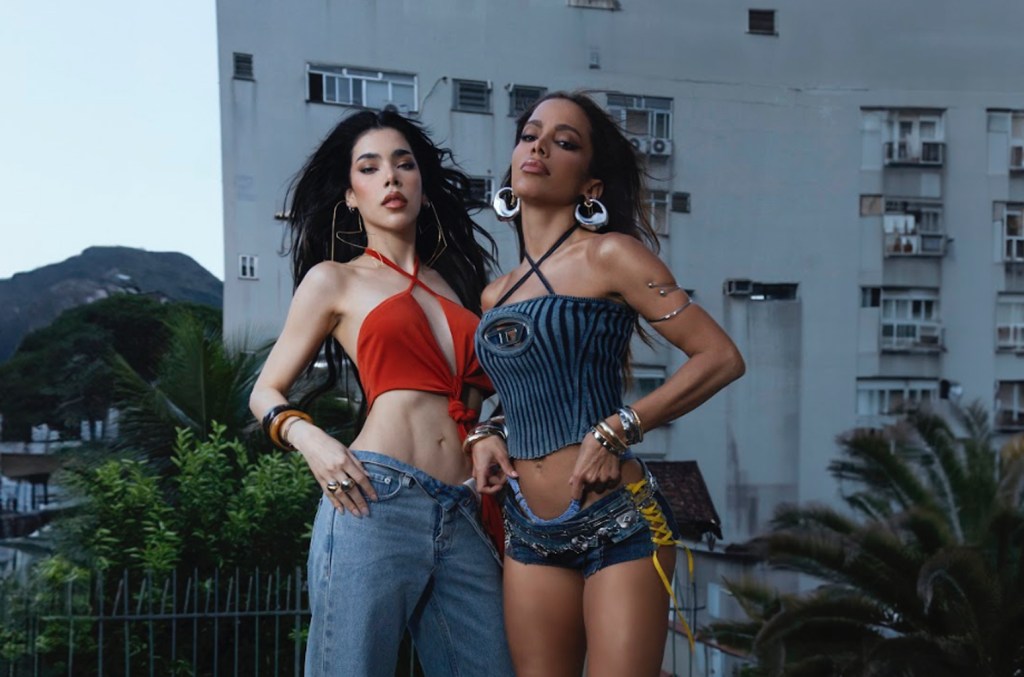As the California sunset paints the sky bright orange on a scorching August day, a caravan of luxury SUVs makes its way across the dirt roads outside Los Angeles that lead to Pico Rivera Sports Arena. When they arrive, the door of one pristine white Mercedes-Benz G-Class opens and 28-year-old Luis R Conriquez emerges. Clad in black jeans; a white, black and yellow-patterned button-down shirt; black boots; and a suede tejana adorned with feathers, he fits right in with the Instagram-ready aesthetic of the largely millennial crowd gathered here. The heavy silver chain resting on his chest is the only obvious signifier that Conriquez isn’t just another attendee of the inaugural Belicolandia: The singer-songwriter is one of today’s biggest corridos bélicos stars, and the thousands assembled here will soon see him close out the festival-like event produced by his label, Kartel Music.
As Conriquez makes his way to his trailer just behind the stage, an intimidating security detail follows — but the musician himself offers friendly smiles to everyone he encounters. Once settled inside the trailer, where he’ll spend the next hour or so, Conriquez really lets down his guard, cracking jokes with good friend Tony Aguirre about how early his fellow corridos singer (another Kartel signee) had performed that day. “That’s how we get along; it’s all jokes,” Conriquez says. “We like to have a good time.” The trailer becomes a revolving door as emerging and established regional Mexican artists alike pop in and out to say hello and snap a quick photo with, as Conriquez’s fans anointed him early in his career, the King of Corridos Bélicos. The moniker isn’t an overstatement: Since debuting in 2019, Conriquez has pioneered the Mexican subgenre that has gone global in the past couple of years thanks to him and peers like Peso Pluma.
It’s been two years since Conriquez last performed at Pico Rivera, the ranch-like, 6,000-capacity multipurpose venue just 15 miles west of L.A. that has catered for decades to música mexicana fans. But even in that short time, much has changed for the Sonora, Mexico-born artist — who catapulted to stardom with his breakthrough hit, “El Buho” — as regional Mexican music has become the largest Latin subgenre in the United States, according to Luminate. Conriquez, who the then-new Kartel signed in 2019 at an audition in Mexicali, Baja California, is known for his corridos bélicos — a term he says he coined himself to describe the subgenre’s sound (not its lyrics, which often name-check Mexican drug kingpins or cartel figures, but are “less violent” than other corridos, Conriquez points out). “ ‘Bélico’ means that something has a lot of presence, and this music stands out thanks to instruments like the tololoche and charchetas,” he explains. “Now, it’s joined forces with corridos tumbados [which fuse the bélicos sound with trap and hip-hop], and that has made this movement even stronger.”
Conriquez, whose raw vocals and in-your-face delivery often sound closer to rapping than singing, has become a go-to collaborator for both regional Mexican acts and other Latin artists, including Nicky Jam, Ryan Castro and Peso Pluma, while dominating the Billboard charts. With 1.42 billion on-demand official streams in the United States, according to Luminate, he has 20 tracks on the Hot Latin Songs chart, and most recently scored his first Hot 100 entry with “Si No Quieres No,” a collaboration with up-and-comer Neton Vega. His Corridos Bélicos, Vol. IV, released in January, earned him his first entry and top 10 on any albums chart, debuting at No. 5 on Top Latin Albums and No. 3 on Regional Mexican Albums. It also became Conriquez’s Billboard 200 entrée with a No. 36 debut.
“That album is like The Last Supper,” he says, beaming with pride. Hyperbolic, but only a little: The set is packed with Mexican music heavy-hitters, bringing together two generations of corridos singers, from Gerardo Ortiz to Tito Double P (Peso Pluma’s cousin and go-to songwriter). “Everyone on that album is my friend,” Conriquez says confidently. “I had been planning this for a year because I wanted to bring artists from the past and current ones. Most of them I invited personally, others called me and asked to be a part of it. If I see you have talent and are a good person, I’ll give you a hand. I do it from my heart. It’s how I’ve always been.”

Martha Galvan
His journey to música mexicana’s top tier didn’t happen overnight. When Conriquez decided in his early 20s that he wanted to be a singer, he had no clue how to make that happen, since he didn’t come from a family of musicians or have a formal music education. But he let nothing stand in his way — not even the naysayers who told him he had no future in music. “I became my biggest fan,” he says. “I come from a family that knows how to have a good time. My mom and dad were always playing music. I grew up listening to corridos and reggaetón. I remember I’d put on my headphones when I was going to sleep and when I woke up, music was still playing in my ears,” he adds with a big smile.
Conriquez began writing corridos around 2017, given the subgenre’s popularity in Sonora, and offered one of his early compositions to a neighborhood camarada (friend) to sing. “Then I was like, ‘Wait, let me try singing it,’ ” he recalls. “I got excited about myself; I knew there was something there, so I kept writing.”
He recorded his first corridos with his guitarist friend Daniel “El Bocho” Ruiz (now a key member of Conriquez’s band), but he wasn’t sure where to go from there — until he came across the YouTube channel of a teen who uploaded videos by other artists. “I contacted him and he uploaded my music, and then people started asking who was singing,” Conriquez says. “It was working.”
Soon after, he started getting DMs on Instagram from an unlikely group of fans. “Some construction workers in the United States wrote me asking if I would write corridos for them,” he says. An unusual request, maybe, but not one Conriquez questioned; after all, it was a source of income. “I asked them to send me a short summary describing themselves so I could get inspired,” he continues. “I’d write, record and send it to them.” Initially, he charged $150 per corrido, but as demand grew, he tripled his fee. “I was my own manager at the time, my own distributor, collecting my own money,” he explains. “I did everything on my own for almost two years. Until I met Freddy and Leo from Kartel Music.”
Alfredo “Freddy” Becerra and Leonardo Soto have known each other since childhood. Both grew up in a trailer park in Santa Maria, an agricultural hub in California’s Central Coast region, and their parents worked picking strawberries. “We became friends because we both had the same mission,” Soto says. “It was the mentality of ‘What are we going to do for our families?’ ”
A few years before they launched Kartel Music, Becerra and Soto started Los Compas, a labor contracting company for agriculture work. But the budding entrepreneurs were looking to venture into other businesses, and they had always shared a love of music. They wanted to be part of the industry, despite not even knowing how it worked. “We weren’t looking to start a label,” Becerra says. “We wanted to be promoters because we felt that the labor contracting company gave us enough experience to try that out first.” But their first event, in 2019, was a total flop, he confesses. They had hired a few local bands for a show in Tijuana, and Becerra explains how they had a stage, tables, chairs, cold beer — almost everything. “The fans were missing,” he says. “No one showed up. We went back home feeling sad, and we said we’d never try this again unless we could handle every single detail, including having artists of our own.”

Luis R Conriquez photographed August 12, 2024 in Riverside, Calif.
Martha Galvan
So, afterward, Becerra and Soto asked the bands they knew to spread the word: They were holding auditions in Mexicali to find the first act for their just-founded label, Kartel Music — rather unconventional but fitting for their atypical approach to the industry. About 12 groups and soloists showed up — including Conriquez, who was then working at a Sonora gas station while writing and singing corridos on the side and had heard about the audition from a friend. “He was so confident onstage,” Soto remembers. He was also the only auditionee who performed originals — his bélico-flavored corridos. “Once he finished performing, we told him he had done a good job and that was pretty much it,” Soto adds. There wasn’t a formal pitch, he says, but both parties wanted to work with each other. Instead of signing a contract, they made a verbal pact to grow together.
Conriquez knew he’d stood out from the crowd. “Freddy and Leo were just starting but so was I,” he says. “It was all about trusting each other. They needed someone to help them grow and I knew I could help them. I would take care of the music; I understood how the business worked because I had been doing this for some time now. I just needed someone to support me.” His first ask of the duo: to buy him new clothes so he could record official videos.
“We took him a bunch of clothes that we bought at Ross [Dress for Less],” Soto says with a chuckle. “You’d be surprised how much we’ve evolved with him. We would go to Ross and Marshalls and show up with a stack of clothes and he’d get so excited because he didn’t have anything. He appreciated it.” Just a few weeks after the audition, they convened in Puerto Peñasco, Mexico, to shoot their first music video — and Becerra and Soto also brought a contract for Conriquez to sign. “But he didn’t even want to see it,” Soto says. “He just said, ‘I’m with you guys.’ ” (Conriquez eventually signed a contract and then some: Today, he’s also co-CEO of Kartel alongside Becerra and Soto; the label now has six other artists on its roster.)
Though Los Compas had no direct connection to the music business, it had been an essential precursor to Kartel. “The story really starts with Los Compas because that provided the money for us to do all of this,” Becerra says, explaining how he and Soto were able to buy Conriquez new instruments and rent studios for him to record in. “Without that first business we wouldn’t have been able to do this. [The money] we made in the labor contracting business would go toward Luis. We didn’t even enjoy ourselves — we put it all toward Kartel.”
During the pandemic, Conriquez and Kartel doubled down on releasing new songs, knowing people were stuck at home and listening to music. “The strategy we implemented of releasing new music constantly, like every week, is what helped him grow in numbers,” Soto says. “The consistency plays a big part. Luis has released a song every Friday since we began working together. For his birthday month, we took a song out every single day. It seems crazy but it’s worked for us.”

Martha Galvan
In 2019, the same year Kartel officially launched, Raymond Tapia, vp of A&R, Latin at Downtown Artist and Label Services, called Soto and Becerra. “I remember hearing [Conriquez’s] song ‘El Buho’ and I was like, ‘Who is this?’ I looked at the song credits and it was Kartel Music. I had never heard of them,” Tapia says. “They had a phone number on their Instagram page so I just cold-called them, and Leo picked up and I told him that I was interested in distributing their music worldwide. That led to a very long work relationship.”
While Downtown doesn’t exclusively distribute Conriquez’s music — Kartel prefers to work with multiple distributors so it can build relationships — the company did distribute Conriquez’s Corridos Bélicos, Vol. IV, his biggest album to date.
“Luis is in a unique space because he came just before the big boom,” Tapia says. “He’s in between two spaces, where he’s not part of the new wave and caters to an older crowd but also brings in the young listeners because of all the collabs he’s done with Eslabon Armado, Junior H and Peso Pluma.”
“I think we both share the thought that collaborating together helps take our music and Mexican culture even further,” Peso says of Conriquez. “[Him] setting that standard from the beginning helped raise our flag to where it is now and will continue to help us grow even more.”
After a streaming boost from “El Buho” and his second big hit, “Me Metí en el Ruedo,” Conriquez began performing small shows in Tijuana, Mexicali and other Mexican cities. Today, he’s selling out back-to-back dates at venues like Guadalajara’s Auditorio Telmex, which holds more than 11,000 people. His touring career stateside and abroad has also taken off. Later this year, he’ll perform at venues including Chicago’s 18,000-capacity Allstate Arena, and he’s set to take his Trakas World Tour to Colombia in November.
One day, he hopes to perform in Spain and Canada. “I don’t see this as a challenge anymore — it’s more like a goal,” he says, nodding to Mexican music’s new global appeal. While changing trends, emerging subgenres and a new generation of hit-makers have rocked música mexicana these past few years, Conriquez is confident he’ll maintain his relevancy. “You have to innovate and, at the same time, not lose your essence, but you do have to jump on the train. It’s why I’m still here.” A corridos singer through and through, last year he dabbled in reggaetón and dembow, proving his versatility. “If I knew how to speak English, I’d be singing in English too,” he jokes but then quickly adds in a more serious tone, “I wanted to record in those styles because I’m a fan. It’s something that feels natural because I grew up listening to that, too. It’s always about adapting because you just never know in music — one day you’re here and the next day you’re not.”
The video for Conriquez and Peso Pluma’s 2022 collaboration “Siempre Pendientes” has more than 40 million YouTube views. In it, the two carry semiautomatic rifles as they tell the story of a soldier who works for Joaquin “El Chapo” Guzmán, founder of the Sinaloa drug cartel. But shortly after its release, the video’s future on YouTube — along with Kartel Music’s entire channel — hung in the balance. As “Siempre Pendientes” began gaining momentum, the clip and Kartel’s channel disappeared from the platform.
“Everything about corridos was stricter then — it was more censored [on digital service providers],” Conriquez says, still visibly shaken by the incident. “And it also happened at a time [when] I was really growing. It’s something that really lowers your morale; it’s like you have everything, but then they try to slow you down. It was frustrating.” (YouTube did not respond to a request for comment by publication time.)
After a few emails to YouTube, Kartel Music was able to get the video and its channel back on the platform. But Conriquez isn’t the first artist — and probably won’t be the last — to face censorship for singing these kinds of songs. Long considered controversial, corridos have been banned from public performance in some Mexican states as cartel violence in the country continues to spiral.
“This censorship has followed regional Mexican music for many years but in reality, it reflects what happens every day in our environment,” says Rafael Valle, programming director of Guadalajara radio station La Ke Buena. “If the song says some word that is not allowed on the radio, obviously we modify the song, but we don’t censor it because that would mean not playing songs that people are constantly requesting. It’s important to note that we’ve also modified Bad Bunny songs because of explicit lyrics. So, it’s not exclusive to regional, but it’s the genre that has been mainly impacted by this stigma.”

Luis R Conriquez photographed August 12, 2024 in Riverside, Calif.
Martha Galvan
At his Pico Rivera show, Conriquez’s provocative corridos bélicos are what really get the crowd going — although his dembow and reggaetón tracks also had his fans perreando (twerking). “My show is like a roller coaster of emotions,” he says. “First you start with corridos and you get all riled up, then a romantic one that makes you fall in love, then a heartbreak one to make you remember your ex and then a dembow to get you dancing. I give the people what they want.”
He plans to keep doing just that — while also inspiring a new generation of regional Mexican singers and songwriters. “I tell the artists we’ve signed to Kartel to not be lazy, to release music constantly and to collaborate because it’ll give value to what they’re doing. I tell them because I care and I want them to grow,” Conriquez says. “The truth is that life has been very good to me. Everything I have wanted I have had through hard work, and I can’t slow down now.”
Billboard Latin Music Week is returning to Miami Beach on Oct. 14-18, with confirmed superstars including Gloria Estefan, Alejandro Sanz and Peso Pluma, among many others. For tickets and more details, visit Billboardlatinmusicweek.com.







